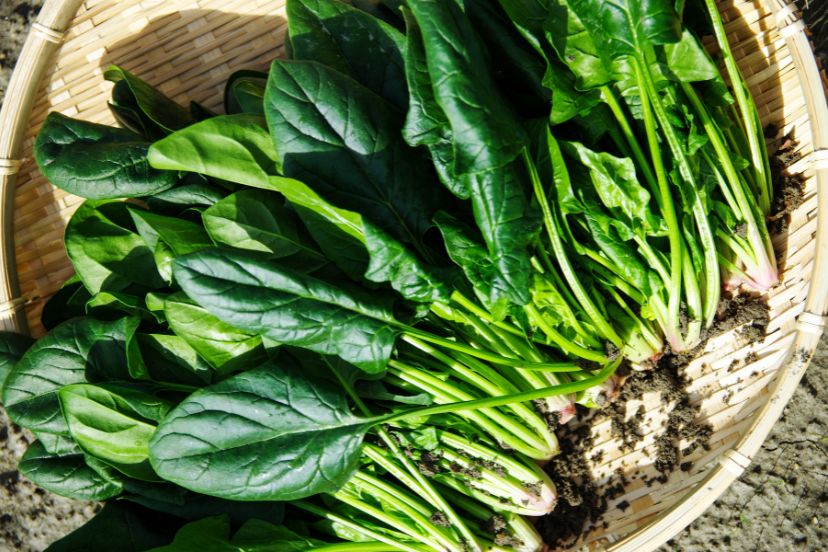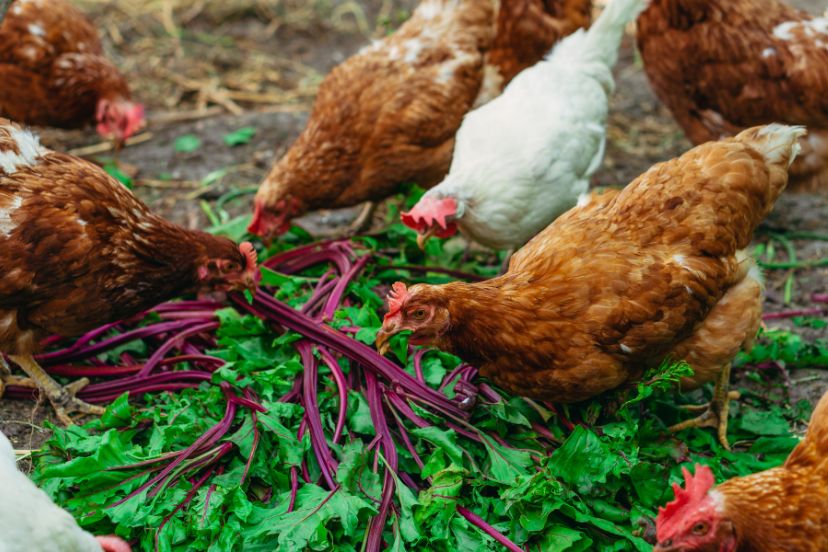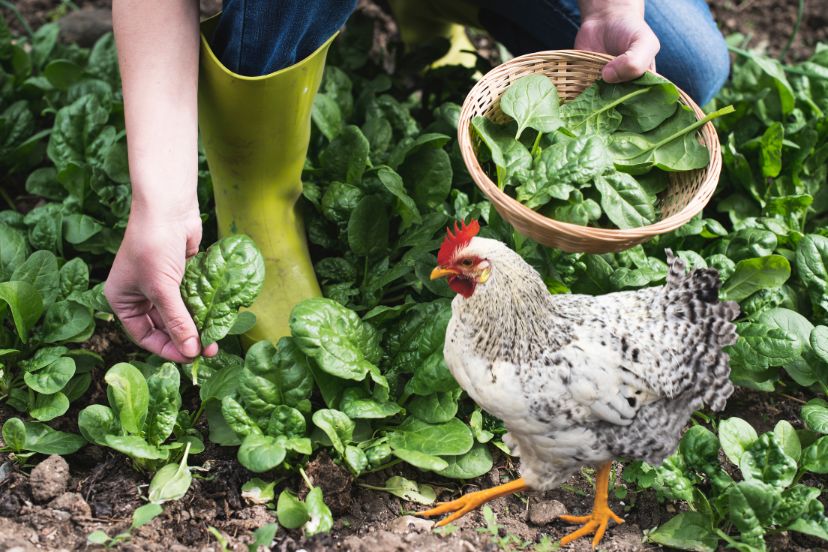Can Chickens Eat Spinach: Benefits, Concerns, & Preparation
Chickens are versatile and curious eaters, often indulging in a wide range of meats as well as an assortment of fruits and veggies. Not only does it provide them with a variety of nutrients, but it also keeps them happy and entertained. Spinach, renowned for its rich vitamin and mineral composition, seems like a splendid choice to incorporate into a chicken’s menu. However, can chickens eat spinach?
Benefits of Spinach for Chickens
When it comes to nourishing your chickens, spinach emerges as an unexpected hero. This verdant vegetable is laden with essential vitamins like A, K, and C. Vitamin A plays a crucial role in vision, bone growth, and reproduction, ensuring that chickens remain in robust health. Vitamins K and C contribute to blood clotting, wound healing, and immunity, respectively. Moreover, the minerals present, particularly iron and calcium, bolster bone health and facilitate vital metabolic processes. If the legendary Popeye gained immense strength from spinach, think about the tremendous benefits it can confer upon our hens!
Yet, the merits of spinach don’t end merely at its nutrient content. In the lively world of chickens, spinach serves a dual role. It’s not just a nutritional supplement but also a source of entertainment. Picture a flock of chickens, animatedly pecking away at lush green spinach leaves, their curious beaks exploring each leaf, their tiny feet shuffling with excitement. This not only provides them with a delectable treat but also a fun and natural way to remain engaged, enriching their daily routines.
Incorporating spinach into a chicken’s diet, thus, brings a blend of health and amusement. It’s a dietary choice that caters to their physiological needs while also tickling their natural instincts and curiosities. Chickens can eat spinach and in a way, it acts as both a superfood and a delightful pastime for these fascinating creatures.
Possible Concerns with Feeding Spinach
While spinach has numerous benefits, it’s essential to understand the potential pitfalls before making it a regular feature in your chicken’s diet. Chief among these concerns is the presence of oxalic acid in spinach. This naturally occurring compound has the potential to be a proverbial thorn in our side—or more aptly, a stumbling block in our chicken’s health.

Oxalic acid, when consumed in large quantities, has a tendency to bind with calcium. This binding creates calcium oxalate crystals, which the body struggles to absorb. As a result, even if the chicken’s diet is rich in calcium, the excessive oxalic acid from the spinach can compromise the absorption of this essential mineral. Calcium, as many chicken enthusiasts know, plays a crucial role in the health of laying hens, especially in the formation of sturdy eggshells. A deficiency or poor absorption of calcium can lead to weak eggshells and other health complications.
However, it’s essential not to sound the alarm bells too soon. Spinach, when fed in moderation, doesn’t pose a significant risk. The trick is to strike a balance. Rotate spinach with other leafy greens and ensure that it doesn’t become the primary source of greens for the flock. This way, your chickens can eat spinach and still enjoy its nutritional benefits without the potential drawbacks of excessive oxalic acid. Remember, as with many things in life, the key to reaping benefits without inviting risks is moderation.
Proper Preparation
Ensuring that the food we give our chickens is not only nutritious but also safe is paramount. Spinach, like many other produce, can often come with unwanted residues. Pesticides, herbicides, and other chemicals are commonly used in agricultural practices to combat pests and enhance crop yields. While these might be deemed safe for human consumption in minimal amounts, they can have detrimental effects on smaller animals, like chickens.
Therefore, a crucial step in feeding spinach to your chickens is to ensure it’s pristine. This entails thoroughly rinsing and washing the spinach leaves under running water. It’s not just about removing visible dirt; it’s about ensuring that any lurking chemical residues are effectively washed away. If possible, sourcing organic spinach can also be an added precaution, reducing the risk of exposing your flock to harmful chemicals.
Guidance on Quantity and Frequency
While spinach is a powerhouse of nutrition, it shouldn’t be the sole green in your chicken’s diet. Think of it as a treat or supplement rather than a staple. Why is that? As previously discussed, substances like oxalic acid, present in spinach, can impact calcium absorption if given in large quantities. Plus, variety is essential for a well-rounded diet, ensuring that the chickens get a spectrum of nutrients.
Therefore, moderation is the watchword here. An ideal regimen would be to offer spinach once or twice a week, perhaps mixed with other vegetables or treats. This frequency allows your chickens to gain from the nutrition that spinach offers without overloading them. By diversifying the treats, you also cater to the chicken’s natural inclination for varied foods, ensuring they don’t tire of one particular treat. It’s all about balance – ensuring health benefits while keeping mealtime exciting for our feathered friends.
Tips for Introducing Spinach to Your Flock
Fresh vs. Cooked Spinach
When contemplating the introduction of spinach to your flock, a common question arises: Should it be fresh or cooked? Both options have their merits. Fresh spinach retains its natural texture and most of its nutrient content, providing a crunchy treat that chickens might relish. On the other hand, cooked spinach is easier to digest and can sometimes be a great way to introduce the vegetable to more finicky eaters.
However, a word of caution if you’re leaning towards the cooked route: avoid additives. While we might enjoy our spinach sautéed with a dash of salt or a sprinkle of oil, such additions aren’t ideal for chickens. Their dietary needs are different from ours, and it’s best to keep their spinach as natural and straightforward as possible.
Spicing it Up with Mix-Ins
For some chickens, the introduction of a new food might be met with a bit of skepticism. They peck around it, giving you that curious look. “What’s this green thing?” they seem to say. In such instances, a great tactic is to mix spinach with treats they’re already familiar with and adore. Mealworms, grains, or even small bits of fruits can be combined with spinach leaves. Not only does this make the spinach more enticing, but it also provides a varied nutritional boost in a single treat!
Other Green Delights
It’s always a good idea to have a backup plan, especially when dealing with the unpredictable tastes of chickens. If, for some reason, spinach doesn’t appeal to your flock or if it’s not readily available, there’s no reason for despair. Nature is bountiful, offering numerous green alternatives that are equally beneficial.
Kale, with its rich nutrient content, can be an excellent substitute. Lettuce, especially the darker varieties, can be another hit with the birds. While cilantro might seem like a simple herb to us, its rich nutritional profile makes it an excellent addition to our chicken’s diet. Remember, the aim is to provide variety and nutrition, and there’s more than one green path to achieve that goal!

Swiss chard, with its vibrant stems and succulent leaves, can also be a delightful treat.
| Read Next: |
Can Chickens Eat Cucumbers?
Can Chickens Eat Cilantro: Benefits and Feeding Tricks
FAQs
How often can chickens eat spinach? Once or twice a week is ideal.
Should I avoid spinach due to oxalic acid? No, just ensure you’re providing it in moderation.
Can I mix spinach with other foods? Absolutely! Try mixing it with grains or other veggies.
What if my chicken doesn’t like spinach? Every chicken is different. If they’re not fans of spinach, try another leafy green.
Are there any other greens I should avoid? Always research before introducing new foods, but generally avoid giving chickens any plants that are toxic to birds.




